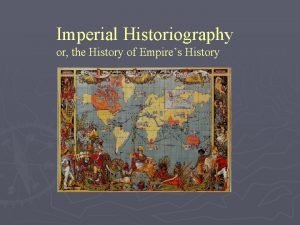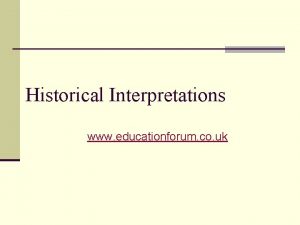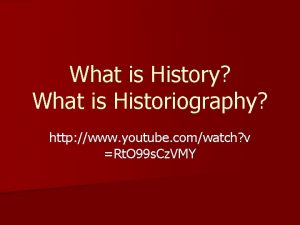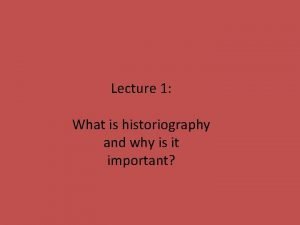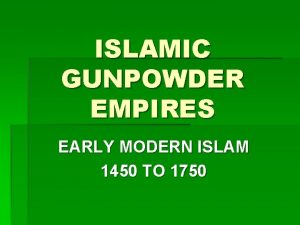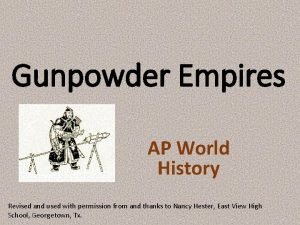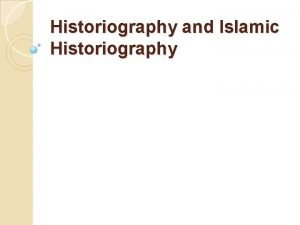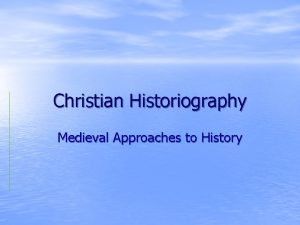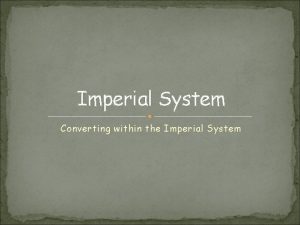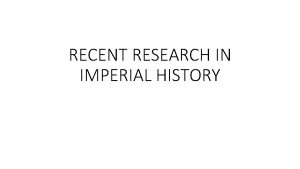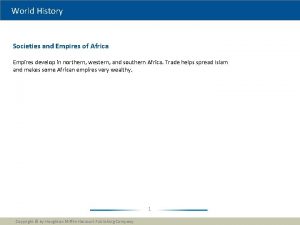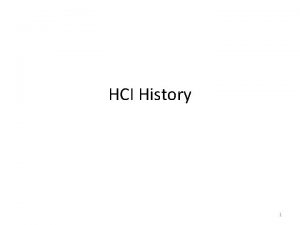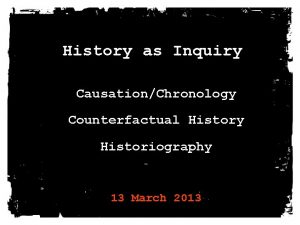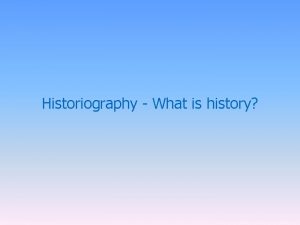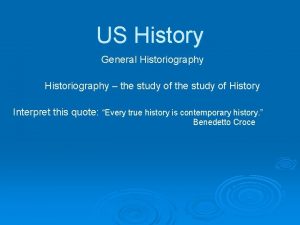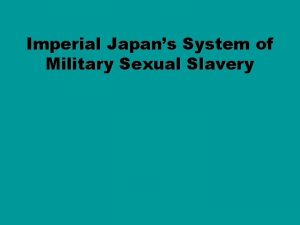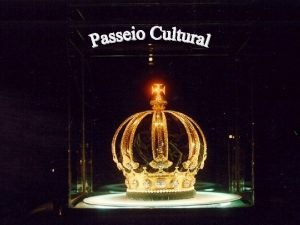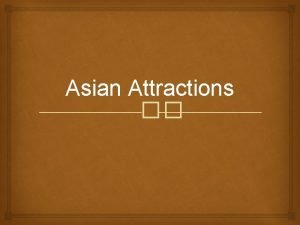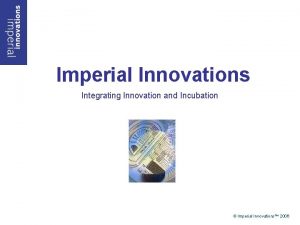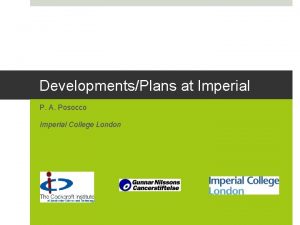Imperial Historiography or the History of Empires History

















- Slides: 17

Imperial Historiography or, the History of Empire’s History

Early Colonial Expansion (to 18 C)

Twentieth Century Empire at its largest – when? why?

Thomas Babbington Macaulay History of England Minute on Education (1835) • England’s cultural ascendancy in India • benevolence of Britain’s rule in India and elsewhere • with English help, India would be independent Exemplifies the Whig school of history: liberty, toleration, improvement = England Progress – yet anxiety

Professional Historians/Public Role Lionel Curtis (1932) Oxford and Cambridge historians – to the world From the early 20 C • Round Table movement • Eventual unification …. as British Commonwealth of Nations Always professional criticism: liberal theoreticians liberal economists Marxism psychoanalytical theory

Progress in Empire: -‘British rule brought to indigenous people the benefits of civilization’ - colonies would advance towards self-governing status or Dominionhood A few good men professional colonial administrators Philip Meadows Taylor (1830 s, India) Clifford Francis (Soloman Islands, 1919)

Imperial Motives: early commercial empire “money, it is a rich man’s world” Economic motives: trade raw materials markets Political motives: geopolitical and military diffuse internal tensions Cultural justification: missionary campaigns the ‘civilizing’ mission

Beyond that: • Imperial decline: was there? if so when did it begin? [A. R. , Boer War, WWI, etc] • Two empire theory: initial, commercial empire dating, characterizing, - to 1780 s? second, modern empire – from 1815? • Twentieth-century challenges old world Empires → new world empire decolonization

End of Empire and new History political concerns of the day shape historical approaches Deconstructing ‘formal’ empire: The times: looking inside the whig narrative specifically, decolonization generally, uprisings in east-bloc youth – educated - dissatisfaction with post-war progress final throwing off of institutional frames Vietnam War Former colonies: looking to re-capture a history Empire-independent ‘New’ historians: w. c. , ♀, non-white, queer, from former colonies interest, and ability to stretch questions

‘New’ Imperialism Deconstructing the Raj: • identifying the politics • questioning dominance • noting the importance of informal Empire • turning the lens back on Britain how has Britain been shaped by Empire, not just how did it shape the world Britain as an Empire at home

‘Forging a Nation’ - Linda Colley Britons From 1707 Both the creation of a strong and vibrant Nation-state commercial opportunity religious security constitutional freedoms domestic security freedom from invasion and, a shotgun marriage – defined by enforcement within and against ‘other’

The ‘glorious’ revolution in Scotland The response in 1698: ‘Jesus Christ is the only Head and King of this church’ – General Assembly Enduring Jacobism • Oath of Allegiance by 1691 • ‘massacre at Glencoe’ Scots tried economic/political resistances: the Darien Scheme the Wine Act the Act Anent Peace and War Act of Security

‘this nation, being poor and without force to protect its commerce, cannot reap great advantage by it, till it partake of the trade and protection of some powerful neighbor nations’ English Alien Act (1705) – Settlement: foreign nation with no right to trade with Britain → the trump one single parliament 45 MPs Scots; 16 Lords 1/12 MPs [1: : 5 million citizens] 15 of 25 articles about trade for independence (unattributed) 18 C French print → FORCED into Union: Empire represents a pull and a push for Scots well educated, formidable fighters; no land or jobs

Y Deddfau Uno, 1535 a 1542 “the people of the same dominion have and do daily use a speche nothing like ne consonant to the naturall mother tonge used within this Realme” …. “utterly to extirpe alle and singular sinister usages and customs belonging to Wales. ”

and across the Irish Sea? Trinity College Dublin est. 1592 ‘Battle of the Boyne’ Wyck c. 1693 • • • troops of William III fought those of James II remembered by ‘Orange Day’ Parades So, the elite Irish who served in Empire were Anglo-Irish, others were economic imperialists

How does ‘other’ define a nation? In this ‘imagined community’: consisting of its own various ethnicities Wars were of central importance: avoided major invasion avoided conscription created consensus Paton, Sir Joseph N. In Memoriam. 1858 Continental Wars: with France who supported the Stuarts Seven Years War supported American colonists after 1778 Napoleonic Wars And Became: colonial conflicts: N. A. , south Asia, Africa, Mediterranean fought elsewhere; small, successful

Conclusion: it is complicated Making sense of empire: power and authority contested and reshaped Terms to know: Formal empire Informal empire Ruapeka Pa, NZ
 Imperial historiography
Imperial historiography Maritime vs land empires
Maritime vs land empires What is historiography
What is historiography What is historiography? *
What is historiography? * What is historiography
What is historiography Gunpowder empires definition ap world history
Gunpowder empires definition ap world history Gunpowder empires ap world history
Gunpowder empires ap world history Thơ thất ngôn tứ tuyệt đường luật
Thơ thất ngôn tứ tuyệt đường luật Các châu lục và đại dương trên thế giới
Các châu lục và đại dương trên thế giới Hổ đẻ mỗi lứa mấy con
Hổ đẻ mỗi lứa mấy con Từ ngữ thể hiện lòng nhân hậu
Từ ngữ thể hiện lòng nhân hậu Diễn thế sinh thái là
Diễn thế sinh thái là Ví dụ về giọng cùng tên
Ví dụ về giọng cùng tên Vẽ hình chiếu vuông góc của vật thể sau
Vẽ hình chiếu vuông góc của vật thể sau 101012 bằng
101012 bằng Lời thề hippocrates
Lời thề hippocrates Chụp tư thế worms-breton
Chụp tư thế worms-breton
